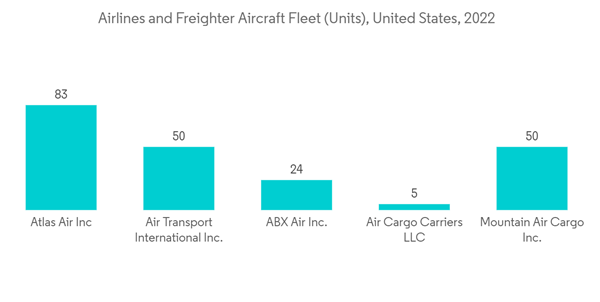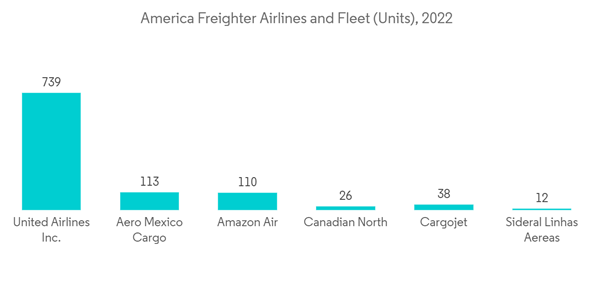A cargo aircraft or a freighter aircraft is a fixed-wing aircraft that is designed or converted for the carriage of cargo rather than passengers. Such aircraft usually do not incorporate passenger amenities and generally feature one or more large doors for loading cargo. Freighters may be operated by civil passenger or cargo airlines, by private individuals, or by the armed forces of individual countries.
The increase in the demand for air cargo leading to an increase in the demand for freighter aircraft in the American region and the increase in trade relationships among different countries are the major factors that will help the freighter aircraft market to witness significant growth during the forecast period. The increase in passenger-to-freighter conversions is expected to act as a solution for the air cargo capacity constraints due to the major demand driven by the e-commerce business.
On the other hand, increasing regulations will likely hamper the market in the long run. There are various regulations or policies that are being formed by various governments across the region to ensure smoother freighter operations. Although some freighter operators have adhered to the policies, there are many freighter operators who still need to comply with the policies, and this can lead to hampering freighter operations during the forecast period.
America Freighter Aircraft Market Trends
Derivative of Non-Cargo Aircraft Segment is Expected to Show Significant Growth During the Forecast Period
The derivative of the non-cargo aircraft segment will showcase significant growth in the American freighter aircraft market during the forecast period. The growth can be attributed to the increasing preference of airlines to modify their old and aging passenger aircraft with freighter aircraft. An increase in passenger-to-freighter conversions will act as a solution for the air cargo capacity constraints due to the major demand driven by the e-commerce business. These converted passenger planes will carry lighter, more voluminous cargo, such as e-commerce packages. During such conversions, aircraft are reinforced with floors that can handle the weight of the freight.In addition, changes are made to the aircraft's fire detection, ventilation, and temperature control systems. This is because freighter aircraft have different requirements than passenger aircraft and must comply with different standards. Some of the available passenger-to-freighter (P2F) aircraft programs are B737, B757, A320, and A321. For instance, Cargojet, a cargo airline in Canada, invested in eight Boeing B777 passenger aircraft that will be converted to a pure cargo configuration. Mammoth Freighters, a US-based modification company, is working on its prototype Boeing B777-200LR conversion project for the cargo carrier Cargojet Airways (W8). The deliveries of these aircraft will be scheduled between 2023 and 2025. Thus, growing investment in converting passengers to freighter aircraft due to increased demand for air cargo drives the market growth.
United States Dominates the Market During the Forecast Period
The United States held the highest shares in the market and continued its domination during the forecast period. The growth is due to the presence large number of aircraft freighter fleets and growing expenditure on the aviation sector. The presence of well flourished aviation sector, the growing number of airlines and airports, and increased demand for air cargo transportation drive the growth of the market across the country.North American air carriers witnessed a 5.1% drop in demand in 2022 compared to 2021, with a capacity increase of 4.2%. Air cargo demand was up 13.7%, and capacity was 8.2% higher compared to 2019. US-China trade tensions hard-hit the North American carriers in 2019. In 2021, IATA announced that Federal Express (FedEx) was the largest cargo airline in the world, which recorded 20.7 billion Cargo Tonne Kilometers (CTK), 5.1% ahead of the 19.66 billion CTK in 2020. Currently, the company operates 697 aircraft, which consist of eight different aircraft variants.
Rising procurement of advanced freighter aircraft with high cargo-carrying capacity and growing contracts from American airlines for passenger-to-freighter conversions drive the growth of the market. For instance, in 2023, FedEx, the largest cargo airline in the US, took delivery of two Boeing B777 freighter aircraft and plans to deploy an additional six B777F aircraft during 2024 and 2025. The company also received 14 Boeing B767-300 freighter aircraft in 2023 and plans to deploy an additional 24 B767F aircraft during 2024 and 2025. Furthermore, FedEx plans to deploy new ATR 72- 600F aircraft for shorter routes and replace its aging ATR-42 aircraft with a Cessna SkyCourier 408 cargo aircraft, which will help to improve fuel efficiency. Such development will likely drive market growth across the country.
America Freighter Aircraft Industry Overview
The American freighter aircraft market is consolidated in nature, with a presence of few global players holding significant shares in the market. Some of the prominent players in the market are The Boeing Company, Airbus SE, Textron Inc., ATR, and Singapore Technologies Engineering Ltd. Increasing expenditure on passenger to freighter conversions from key OEMs and rising development of advanced solutions for cargo airlines drive the market growth. To address the increasing demand from the air cargo industry, the key players in the market are investing in developing a newer generation of freighter aircraft that will be more fuel-efficient. For instance, in 2022, the Boeing Company delivered the 100th contracted 737-800 Boeing Converted Freighter. The freighter aircraft was delivered to AerCap Cargo in September 2022. In addition to that, Airbus SE introduced the BelugaST 'Super-Transporter' aircraft, which is based on the A300-600 design and will be used to offer outsized freight transportation for customers worldwide.Additional Benefits:
- The market estimate (ME) sheet in Excel format
- 3 months of analyst support
This product will be delivered within 2 business days.
Table of Contents
Companies Mentioned (Partial List)
A selection of companies mentioned in this report includes, but is not limited to:
- Airbus SE
- Lockheed Martin Corporation
- The Boeing Company
- Textron Inc.
- ATR
- Aeronautical Engineers Inc.
- Precision Aircraft
- ST Engineering
- Pemco Conversion
- Israel Aerospace Industries Ltd
- Kelowna Flightcraft










